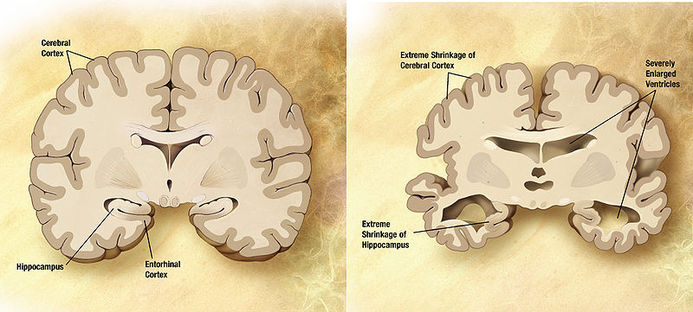Diseases, also know as when disruptions in homeostasis effect the body, causing it to become "off-balanced" and act differently then when healthy. After discovering about the many parts and purposes of the nervous system, we will move onto the diseases that effect the body if they find their way into the nervous system.
Diseases
Alzheimer's Disease

L: healthy aged brain R: Brain with Alzheimer
Alzheimer's disease is a disease typically found in people over 65 years old. The cause of the disease is unknown, but researchers think that tangles in the brain are associated with alzheimer's. Alzheimer's disease is the most common form of dementia. About 27 million people are diagnosed with this disease. Symptoms include: stress, confusion, aggression, mood swings, language loss, long term memory loss, loss of body functions, and death.
Tourettes Syndrome
Torettes is an inherited disorder, characterized by physical tics and vocal tics. Once, tourettes was consider very rare. Now five children out of one thousand have tourettes syndrome. Life expectancy for people with tourettes is normal. The severity of tics decreases as age increases. The exact cause of tourettes is unknown but researchers think that genetics and environment is involved. Most times tourettes is passed on by genetics, but in some cases the cause is unknown. There is a 50 out of 100 chance that a person with tourettes will pass it on to their children. Only very severe cases require medical attention. Males usually have more severe cases then females. The two tics are:
• Motor Tics-
involuntary movement that is mostly involving face or neck. Examples are blinking, nose twitching, and shrugging. Tics can be simple or complex. A simple tic is a brief single tic, so no other tics are experienced at the same time. Complex tics are series of tics.
• Vocal Tics-
The most common symptom of tourettes. They include everything from clearing the throat, sniffing, grunting or barking nonsense words.
Many kids with tourettes also have attention deficit hyperactivity disorder, (ADHD) or obsessive-compulsive disorder (OCD). To be diagnosed, someone has to have symptoms for one year, and there must be a period longer then 3 months were there were no tics.
• Motor Tics-
involuntary movement that is mostly involving face or neck. Examples are blinking, nose twitching, and shrugging. Tics can be simple or complex. A simple tic is a brief single tic, so no other tics are experienced at the same time. Complex tics are series of tics.
• Vocal Tics-
The most common symptom of tourettes. They include everything from clearing the throat, sniffing, grunting or barking nonsense words.
Many kids with tourettes also have attention deficit hyperactivity disorder, (ADHD) or obsessive-compulsive disorder (OCD). To be diagnosed, someone has to have symptoms for one year, and there must be a period longer then 3 months were there were no tics.
